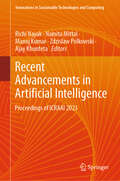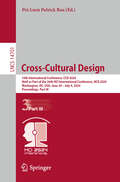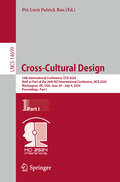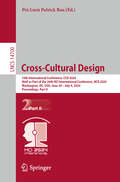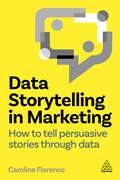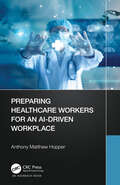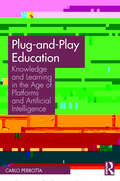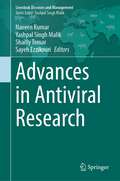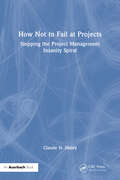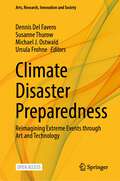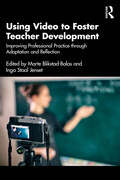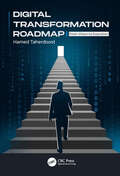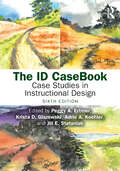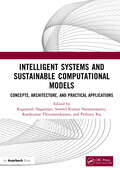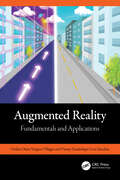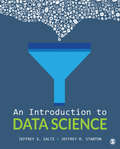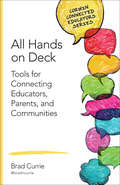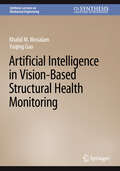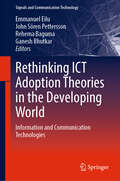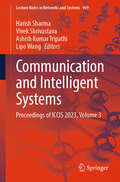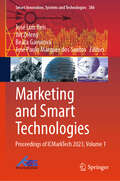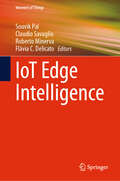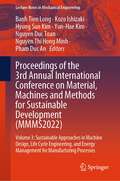- Table View
- List View
Recent Advancements in Artificial Intelligence: Proceedings of ICRAAI 2023 (Innovations in Sustainable Technologies and Computing)
by Manoj Kumar Namita Mittal Zdzislaw Polkowski Richi Nayak Ajay KhuntetaThis book features research papers presented at the Second International Conference on Recent Advancements in Artificial Intelligence (ICRAAI 2023), held at Poornima University, Jaipur, India during 15 – 16 December 2023. The book presents original research work in the areas of computational intelligence, artificial intelligence, machine learning, data science and data analytics, cloud computing, and internet of things. The book is beneficial for readers from both academia and industry.
Cross-Cultural Design: 16th International Conference, CCD 2024, Held as Part of the 26th HCI International Conference, HCII 2024, Washington, DC, USA, June 29 – July 4, 2024, Proceedings, Part III (Lecture Notes in Computer Science #14701)
by Pei-Luen Patrick RauThis four-volume set LNCS 14699-14702 constitutes the thoroughly refereed proceedings of the 16th International Conference on Cross-Cultural Design 2024 (CCD 2024), held as part of the 26th International Conference on Human-Computer Interaction, HCI International 2024 (HCII 2024), was held as a hybrid event in Washington DC, USA, during June/July 2024. The total of 1271 papers and 309 posters included in the HCII 2023 proceedings was carefully reviewed and selected from 5108 submissions. The CCD 2024 conference focuses a broad range of theoretical and applied issues related to Cross-Cultural Design and its applications, and much more.
Cross-Cultural Design: 16th International Conference, CCD 2024, Held as Part of the 26th HCI International Conference, HCII 2024, Washington, DC, USA, June 29 – July 4, 2024, Proceedings, Part I (Lecture Notes in Computer Science #14699)
by Pei-Luen Patrick RauThis four-volume set LNCS 14699-14702 constitutes the thoroughly refereed proceedings of the 16th International Conference on Cross-Cultural Design 2024 (CCD 2024), held as part of the 26th International Conference on Human-Computer Interaction, HCI International 2024 (HCII 2024), was held as a hybrid event in Washington DC, USA, during June/July 2024. The total of 1271 papers and 309 posters included in the HCII 2023 proceedings was carefully reviewed and selected from 5108 submissions. The CCD 2024 conference focuses a broad range of theoretical and applied issues related to Cross-Cultural Design and its applications, and much more.
Cross-Cultural Design: 16th International Conference, CCD 2024, Held as Part of the 26th HCI International Conference, HCII 2024, Washington, DC, USA, June 29 – July 4, 2024, Proceedings, Part II (Lecture Notes in Computer Science #14700)
by Pei-Luen Patrick RauThis four-volume set LNCS 14699-14702 constitutes the thoroughly refereed proceedings of the 16th International Conference on Cross-Cultural Design 2024 (CCD 2024), held as part of the 26th International Conference on Human-Computer Interaction, HCI International 2024 (HCII 2024), was held as a hybrid event in Washington DC, USA, during June/July 2024. The total of 1271 papers and 309 posters included in the HCII 2023 proceedings was carefully reviewed and selected from 5108 submissions. The CCD 2024 conference focuses a broad range of theoretical and applied issues related to Cross-Cultural Design and its applications, and much more.
Data Storytelling in Marketing: How to Tell Persuasive Stories Through Data
by Caroline FlorenceMarketers are storytellers, they write content, marketing strategies and devise internal communications, but unless these stories are evidence-based, they won't be believable or truly persuasive. Understanding how to use data to build and tell stories is an increasingly important part of the modern-day marketers' toolkit. Stories centered on robust evidence and credible data can withstand challenges, provide meaning, offer insight and engage audiences.This book is designed to plug the data storytelling skills gap and enable marketing professionals to cut through the data overload, join the data dots and create engaging narratives and content. Regardless of whether you're a data expert, data anxious or a data sceptic, this book will give you the tools to help you to communicate more effectively with your customers and your stakeholders. Written by expert trainer Caroline Florence, this book outlines how to build robust and compelling data stories. Drawing on her client work with companies such as Toyota, Lactalis, News UK, Mars Petcare and AXA, plus contributions from experts across data, insights, marketing and customer experience, this book provides a practical roadmap to increase your influence with data storytelling.
Preparing Healthcare Workers for an AI-Driven Workplace
by Anthony Matthew HopperA large number of healthcare employees, whether they are on the frontlines or in management, work in complex, fluid environments. They must perform a diverse number of sometimes intricate tasks on a daily basis as well as excel in handling ad hoc interactions with patients, residents, coworkers, or other stakeholders. In the coming years, these workers will also have to adjust to disruptions in their workplaces that are brought about by the introduction of new Artificial Intelligence (AI) systems and health information technologies (HITs) into their offices and clinics. Many of these workers will find themselves competing for jobs not only with other humans but also with machines.Preparing Healthcare Workers for an AI-Driven Workplace helps healthcare professionals to develop their core critical thinking skills while also enabling them to develop methodologies for successfully completing complex projects by themselves, dealing with ad hoc interactions, and taking advantage of the coming AI- and IT-driven changes in their workplaces. The book begins with explaining why healthcare workers, whether they work on the frontlines or in management, need to be strong critical thinkers. It breaks down “critical thinking” into its key elements and provides methods that readers can use to help them to master critical thinking and grow to become elite critical thinkers. The book also provides tips on how to handle ad hoc conversations with supervisors, coworkers, patients, residents, and other stakeholders. Examining how AI- and IT-related developments will transform the healthcare ecosystem in the coming years, the book identifies key mindsets and strategies for thriving in technologically rich healthcare environments.
Plug-and-Play Education: Knowledge and Learning in the Age of Platforms and Artificial Intelligence
by Carlo PerrottaPlug-and-Play Education: Knowledge and Learning in the Age of Platforms and Artificial Intelligence documents and critiques how the education sector is changing with the advancement of ubiquitous edtech platforms and automation. As programmability and computation reengineer institutions towards efficiency and prediction, the perpetual collection of and access to digital data is creating complex opportunities and concerns. Drawing from research into secondary and higher education settings, this book examines the influence of digital “infrastructuring”, the automation of teaching and learning, and the very purpose of education in a context of growing platformisation and artificial intelligence integration. These theoretical, practical, and policy-oriented insights will offer educational technologists, designers, researchers, and policymakers a more inclusive, diverse, and open-ended perspective on the design and implementation of learning technologies.
Advances in Antiviral Research (Livestock Diseases and Management)
by Naveen Kumar Yashpal Singh Malik Shailly Tomar Sayeh EzzikouriThis book illustrates advancements in the sophisticated tools and techniques for discovering and designing new antiviral drugs, identifying approved drugs against new and emerging viruses through large-scale computational virtual screening or drug repurposing approaches, and their evaluation in various in vitro and in vivo models. The chapters also cover the challenges associated with the emergence of antiviral drug resistance and possible ways to counter them. It discusses bioinformatics tools and software and computational approaches for the discovery of antivirals. The books also outline approaches for designing broad-spectrum antivirals effective against viruses by epigenetic- and epitranscriptomic-targeted reprogramming. Further, it provides vital details on the procedures for drug applications, clinical trials, and their regulations. Finally, the book provides a comprehensive yet representative description of advances in antiviral research protocols and methodologies suitablefor antiviral researchers at all career stages, including graduate and postgraduate students and policy-makers.
How Not to Fail at Projects: Stopping the Project Management Insanity Spiral
by Claude H. MaleyThey say that repeating the same thing and expecting a different result is insanity. This book aims to analyze the reasons for failure in project management. It is filled with stories, anecdotes and satires that highlight how organizations and project managers fall into an “insanity spiral”. It provides seven Sanity Checks designed to keep project managers from repeating the same mistakes and to help them become project champions: The first sanity check is how and when to appoint a project manager. This first sanity check may be familiar and may well bring back memories of starting a career in project management. The second sanity check is the comprehension of why a project is needed. It helps to overcome the misunderstanding that many have on the nature of projects and its management. The third sanity check is the understanding of the unknown and emphasizes the importance of risk management. The fourth sanity check is capturing who needs what. It is about the constant pursuit to satisfy a host of individuals and at times the, sometimes seemingly, unsurmountable quest to secure resources for a project. The fifth sanity check is who does what. It also deals with satisfying stakeholders and obtaining resources. The sixth sanity check is outside assistance. It is all about breaking the us versus them syndrome when outsourcing in a project. The seventh and most important sanity check is engaging the efforts of others as it deals with people—the lifeblood of any organization. The book concludes with a chapter on composing and building powerful microservices. With the exponential growth of IoT devices, microservices are being developed and deployed on resource-constrained but resource-intensive devices in order to provide people-centric applications. The book discusses the challenges of these applications. Finally, the book looks at the role of microservices in smart environments and upcoming trends including ubiquitous yet disappearing microservices.
Climate Disaster Preparedness: Reimagining Extreme Events through Art and Technology (Arts, Research, Innovation and Society)
by Michael J. Ostwald Ursula Frohne Dennis Del Favero Susanne ThurowAs a result of global warming, extreme events, such as firestorms and flash floods, pose increasingly unpredictable and uncertain existential threats, taking lives, destroying communities, and wreaking havoc on habitats. Current aesthetic, technological and scientific frameworks struggle to imagine, visualise and rehearse human interactions with these events, hampering the development of proactive foresight, readiness and response.This open access book demonstrates how the latest advances in creative arts, intelligent systems and climate science can be integrated and leveraged to transform the visualisation of extreme event scenarios. It reframes current practice from passive perception of pre-scripted illustrations to active immersion in evolving life-like interactive scenarios that are geo-located. Drawing on the multidisciplinary expertise of leaders in the creative arts, climate sciences, environmental engineering, and intelligent systems, this book examines the waysin which climate disaster preparedness can be reformulated through practices that address dynamic and unforeseen interactions between climate and human life worlds. Grouped into four sections (picturing, narrating, rehearsing, and communicating), this book maps this approach by exploring the emerging strengths and current limitations of each discipline in addressing the challenge of envisioning the unpredictable interaction of extreme events with human populations and environments. This book provides a timely intervention into the global discourse on how art, culture and technology can address climate disaster resilience. It appeals to readers from multiple fields, offering academic, industry and community audiences novel insights into a profound gap in the current knowledge, policy and action landscape.
Using Video to Foster Teacher Development: Improving Professional Practice through Adaptation and Reflection
by Marte Blikstad-Balas Inga Staal JensetFeaturing an international team of education researchers and practitioners, this edited volume demonstrates various ways in which the use of video recordings can shed light on and improve teaching processes in the classroom environment.Providing a novel and global approach to this burgeoning area of research, chapters highlight how authentic video clips can be used systematically in both teacher education and professional development programs to ensure lifelong professional reflection and growth for teachers. Through detailed insight into research projects where teachers and teacher educators use video to improve practice, the book provides a research-based response to why and how videos can be used to raise instructional quality and discuss key issues in the field.Exploring findings from empirically based research combined with everyday practices, the volume will ultimately serve as a solid and inspiring introduction to the growing body of research on the use of video in teacher learning for educational researchers and educators interested in teaching and teaching practices, as well as practitioners in the fields of teacher education and teachers’ professional development.
Digital Transformation Roadmap: From Vision to Execution
by Hamed TaherdoostIn a world undergoing rapid technological evolution, this is your indispensable guide to thriving in the digital age. Digital Transformation Roadmap: From Vision to Execution offers a comprehensive exploration of the Fourth Industrial Revolution by presenting a roadmap for leveraging technology to revolutionize businesses, strategy, and innovation.Embark on a journey that unveils the dynamic interplay between technology and business. Discover the evolution of tech life cycles, the significance of digital transformation, and the key domains of change reshaping industries. Explore strategies to gain competitive advantage, from reimagining business models to aligning digital visions with organizational goals. Experience a holistic approach to digital transformation.Learn how to empower employees, foster a culture of innovation, and navigate change adeptly. Delve into the world of emerging technologies such as AI, IoT, and blockchain, and harness their potential to open new avenues for growth.From cybersecurity roadmaps to measuring system performance, uncover essential practices to ensure the resilience and success of digital initiatives. Master the art of delivering exceptional digital customer experiences and harnessing the value of data.Whether you’re a business leader, strategist, or tech enthusiast, this book equips you with actionable insights, practical strategies, and a forward-thinking mindset to drive change and thrive in the digital landscape.
The ID CaseBook: Case Studies in Instructional Design
by Peggy A. Ertmer Krista D. Glazewski Jill E. Stefaniak Adrie A. KoehlerThe ID CaseBook provides instructional design students with 25 realistic, open-ended case studies that encourage adept problem-solving across a variety of client types and through all stages of the process. After an introduction to the technique of case-based reasoning, the book offers four sections dedicated to K–12, informal learning, post-secondary, and industry clients, respectively, each comprising varied, detailed cases created by instructional design experts. All cases, alongside their accompanying discussion questions, encourage students to analyze the available information, develop action plans, and consider alternative possibilities in resolving problems. This revised and updated sixth edition attends to the profound impacts that public health crises; urgent access, equity, and inclusion needs among diverse learners; and a rapidly expanded reliance on digital learning formats have had on the design of learning today.
Intelligent Systems and Sustainable Computational Models: Concepts, Architecture, and Practical Applications
by Pethuru Raj Rajganesh Nagarajan Ramkumar Thirunavukarasu Senthil Kumar NarayanasamyThe fields of intelligent systems and sustainability have been gaining momentum in the research community. They have drawn interest in such research fields as computer science, information technology, electrical engineering, and other associated engineering disciples. The promise of intelligent systems applied to sustainability is becoming a reality due to the recent advancements in the Internet of Things (IoT), Artificial Intelligence, Big Data, blockchain, deep learning, and machine learning. The emergence of intelligent systems has given rise to a wide range of techniques and algorithms using an ensemble approach to implement novel solutions for complex problems associated with sustainability.Intelligent Systems and Sustainable Computational Models: Concepts, Architecture, and Practical Applications explores this ensemble approach towards building a sustainable future. It explores novel solutions for such pressing problems as smart healthcare ecosystems, energy efficient distributed computing, affordable renewable resources, mitigating financial risks, monitoring environmental degradation, and balancing climate conditions. The book helps researchers to apply intelligent systems to computational sustainability models to propose efficient methods, techniques, and tools. The book covers such areas as: Intelligent and adaptive computing for sustainable energy, water, and transportation networks Blockchain for decentralized systems for sustainable applications, systems, and infrastructure IoT for sustainable critical infrastructure Explainable AI (XAI) and decision-making models for computational sustainability Sustainable development using edge computing, fog computing and cloud computing Cognitive intelligent systems for e-learning Artificial Intelligence and machine learning for large scale data Green computing and cyber physical systems Real-time applications in healthcare, agriculture, smart cities, and smart governance.By examining how intelligent systems can build a sustainable society, the book presents systems solutions that can benefit researchers and professionals in such fields as information technology, health, energy, agricultural, manufacturing, and environmental protection.
Augmented Reality: Fundamentals and Applications
by Osslan Osiris Vergara Villegas Vianey Guadalupe Cruz SánchezThis book focuses on augmented reality (AR) technology, which uses the real environment to superimpose virtual elements. Therefore, the reader can create applications that simulate scenarios that can be dangerous or expensive to generate in the real world. AR has proven helpful in education, marketing, and industrial scenarios. AR technology improves the user experience of various disciplines, incorporating virtual information that maximizes the experience and adds knowledge. This book intends students, researchers, and developers to have the possibility of finding the foundations on which AR technology rests.Our book intends that students, researchers, and developers: (i) learn the basics of AR; (ii) understand the technologies that support AR; (iii) know about AR applications that have been a watershed; (iv) gain an understanding of the critical elements needed to implement an AR application; (v) acquire skill in the step-by-step development of an AR application; (vi) learn how to use the instruments to evaluate an AR application; (vii) understand how to present the information about study cases; and (viii) gain knowledge about AR challenges and trends.
An Introduction to Data Science
by Jeffrey S. Saltz Jeffrey Morgan StantonAn Introduction to Data Science is an easy-to-read, gentle introduction for advanced undergraduate, certificate, and graduate students coming from a wide range of backgrounds into the world of data science. After introducing the basic concepts of data science, the book builds on these foundations to explain data science techniques using the R programming language and RStudio® from the ground up. Short chapters allow instructors to group concepts together for a semester course and provide students with manageable amounts of information for each concept. By taking students systematically through the R programming environment, the book takes the fear out of data science and familiarizes students with the environment so they can be successful when performing advanced functions. The authors cover statistics from a conceptual standpoint, focusing on how to use and interpret statistics, rather than the math behind the statistics. This text then demonstrates how to use data effectively and efficiently to construct models, predict outcomes, visualize data, and make decisions. Accompanying digital resources provide code and datasets for instructors and learners to perform a wide range of data science tasks.
All Hands on Deck: Tools for Connecting Educators, Parents, and Communities (Corwin Connected Educators Series)
by Brad M. CurrieBring communities together for involvement that makes a difference! Impact your students in a positive way and join the leagues of educators who are learning to engage with students, parents, and communities using social media and Web 2.0 technologies. Featuring practical strategies that you’ll want to put to use right away, plus a dedicated series website for additional resources, this short and easy-to-follow book will show you: How smartphones and tablets can work for your goals The secret to getting—and keeping—parents involved How to inform, engage, and empower stakeholders How tools like Skype can connect the community at large The Corwin Connected Educators series is your key to unlocking the greatest resource available to all educators: other educators. Being a Connected Educator is more than a set of actions: it’s a belief in the potential of technology to fuel lifelong learning. "Currie harnesses the key element in today’s social media-infused school environment—‘Knowledge is Power!’ He illustrates just how we need to use this knowledge to support our schools, students, and communities." Daisy Dyer Duerr, Principal St. Paul Public Schools "This book provides educators with a diversified look at the connections schools can make with technology. It will inspire all of us, on a global scale, to stay active in ways once thought unimaginable." Salome Thomas-EL, Award-winning principal and author
An Introduction to Data Science
by Jeffrey S. Saltz Jeffrey Morgan StantonAn Introduction to Data Science is an easy-to-read, gentle introduction for advanced undergraduate, certificate, and graduate students coming from a wide range of backgrounds into the world of data science. After introducing the basic concepts of data science, the book builds on these foundations to explain data science techniques using the R programming language and RStudio® from the ground up. Short chapters allow instructors to group concepts together for a semester course and provide students with manageable amounts of information for each concept. By taking students systematically through the R programming environment, the book takes the fear out of data science and familiarizes students with the environment so they can be successful when performing advanced functions. The authors cover statistics from a conceptual standpoint, focusing on how to use and interpret statistics, rather than the math behind the statistics. This text then demonstrates how to use data effectively and efficiently to construct models, predict outcomes, visualize data, and make decisions. Accompanying digital resources provide code and datasets for instructors and learners to perform a wide range of data science tasks.
All Hands on Deck: Tools for Connecting Educators, Parents, and Communities (Corwin Connected Educators Series)
by Brad M. CurrieBring communities together for involvement that makes a difference! Impact your students in a positive way and join the leagues of educators who are learning to engage with students, parents, and communities using social media and Web 2.0 technologies. Featuring practical strategies that you’ll want to put to use right away, plus a dedicated series website for additional resources, this short and easy-to-follow book will show you: How smartphones and tablets can work for your goals The secret to getting—and keeping—parents involved How to inform, engage, and empower stakeholders How tools like Skype can connect the community at large The Corwin Connected Educators series is your key to unlocking the greatest resource available to all educators: other educators. Being a Connected Educator is more than a set of actions: it’s a belief in the potential of technology to fuel lifelong learning. "Currie harnesses the key element in today’s social media-infused school environment—‘Knowledge is Power!’ He illustrates just how we need to use this knowledge to support our schools, students, and communities." Daisy Dyer Duerr, Principal St. Paul Public Schools "This book provides educators with a diversified look at the connections schools can make with technology. It will inspire all of us, on a global scale, to stay active in ways once thought unimaginable." Salome Thomas-EL, Award-winning principal and author
Artificial Intelligence in Vision-Based Structural Health Monitoring (Synthesis Lectures on Mechanical Engineering)
by Khalid M. Mosalam Yuqing GaoThis book provides a comprehensive coverage of the state-of-the-art artificial intelligence (AI) technologies in vision-based structural health monitoring (SHM). In this data explosion epoch, AI-aided SHM and rapid damage assessment after natural hazards have become of great interest in civil and structural engineering, where using machine and deep learning in vision-based SHM brings new research direction. As researchers begin to apply these concepts to the structural engineering domain, especially in SHM, several critical scientific questions need to be addressed: (1) What can AI solve for the SHM problems? (2) What are the relevant AI technologies? (3) What is the effectiveness of the AI approaches in vision-based SHM? (4) How to improve the adaptability of the AI approaches for practical projects? (5) How to build a resilient AI-aided disaster prevention system making use of the vision-based SHM? This book introduces and implements the state-of-the-art machine learning and deep learning technologies for vision-based SHM applications. Specifically, corresponding to the above-mentioned scientific questions, it consists of: (1) motivation, background & progress of AI-aided vision-based SHM, (2) fundamentals of machine learning & deep learning approaches, (3) basic AI applications in vision-based SHM, (4) advanced topics & approaches, and (5) resilient AI-aided applications. In the introduction, a brief coverage about the development progress of AI technologies in the vision-based area is presented. It gives the readers the motivations and background of the relevant research. In Part I, basic knowledges of machine and deep learning are introduced, which provide the foundation for the readers irrespective of their background. In Part II, to verify the effectiveness of the AI methods, the key procedure of the typical AI-aided SHM applications (classification, localization, and segmentation) is explored, including vision data collection, data pre-processing,transfer learning-based training mechanism, evaluation, and analysis. In Part III, advanced AI topics, e.g., generative adversarial network, semi-supervised learning, and active learning, are discussed. They aim to address several critical issues in practical projects, e.g., the lack of well-labeled data and imbalanced labels, to improve the adaptability of the AI models. In Part IV, the new concept of “resilient AI” is introduced to establish an intelligent disaster prevention system, multi-modality learning, multi-task learning, and interpretable AI technologies. These advances are aimed towards increasing the robustness and explainability of the AI-enabled SHM system, and ultimately leading to improved resiliency.The scope covered in this book is not only beneficial for education purposes but also is essential for modern industrial applications. The target audience is broad and includes students, engineers, and researchers in civil engineering, statistics, and computer science. Unique Book Features:• Provide a comprehensive review of the rapidly expanding field of vision-based structural health monitoring (SHM) using artificial intelligence approaches. • Re-organize fundamental knowledge specific to the machine and deep learning in vision tasks.• Include comprehensive details about the procedure of conducting AI approaches for vision-based SHM along with examples and exercises.• Cover a vast array of special topics and advanced AI-enabled vision-based SHM applications.• List a few potential extensions for inspiring the readers for future investigation.
Rethinking ICT Adoption Theories in the Developing World: Information and Communication Technologies (Signals and Communication Technology)
by Emmanuel Eilu Ganesh Bhutkar Rehema Baguma John Sören PetterssonThis book provides extended frameworks and models to help with the adoption of information and communication technologies (ICT) in developing countries. The book first discusses the extent to which conventional ICT theories can be rigid in nature, often unable to handle the constant advances in technology, and technology adoption, implementation, usage, and disposal, not to mention different needs and cost availability in developing countries. The authors go on to show how new and revised models, tested in many societies in developing countries, can solve this mismatch. The authors provide examples of successful ICT adoption in developing country settings, in the areas of agriculture, culture, forestry, education, economics, health, and governance. The authors also show how techniques from persuasive design, philosophical designs, and motivational designs have been adjusted to facilitate successful ICT adoption, implementation, usage, and disposal in targeted regions.
Communication and Intelligent Systems: Proceedings of ICCIS 2023, Volume 3 (Lecture Notes in Networks and Systems #969)
by Lipo Wang Harish Sharma Vivek Shrivastava Ashish Kumar TripathiThis book gathers selected research papers presented at the Fifth International Conference on Communication and Intelligent Systems (ICCIS 2023), organized by Malaviya National Institute of Technology Jaipur, India, during December 16–17, 2023. This book presents a collection of state-of-the-art research work involving cutting-edge technologies for communication and intelligent systems. Over the past few years, advances in artificial intelligence and machine learning have sparked new research efforts around the globe, which explore novel ways of developing intelligent systems and smart communication technologies. The book presents single- and multi-disciplinary research on these themes to make the latest results available in a single, readily accessible source. The work is presented in three volumes.
Marketing and Smart Technologies: Proceedings of ICMarkTech 2023, Volume 1 (Smart Innovation, Systems and Technologies #386)
by José Luís Reis José Paulo Marques dos Santos Jiří Zelený Beáta GavurováThis book includes selected papers presented at the International Conference on Marketing and Technologies (ICMarkTech 2023), held at Faculty of Economics and Management (FEM), Czech University of Life Sciences Prague (CZU), in partnership with University College Prague (UCP), in Prague, Czech Republic, between 30 November and 2 December 2023. It covers up-to-date cutting-edge research on artificial intelligence applied in marketing, virtual and augmented reality in marketing, business intelligence databases and marketing, data mining and big data, marketing data science, web marketing, e-commerce and v-commerce, social media and networking, geomarketing and IoT, marketing automation and inbound marketing, machine learning applied to marketing, customer data management and CRM, and neuromarketing technologies.
IoT Edge Intelligence (Internet of Things)
by Flávia C. Delicato Roberto Minerva Souvik Pal Claudio SavaglioThis book explores fundamental and advanced concepts related to the AI-enabled Edge Technology paradigm, also known as Edge Intelligence, within the framework of the Internet of Things (IoT). Expanding the application of Edge computing is increasingly necessary. This can involve exploring automated, intelligent computational learning theorems, and ANN-oriented, trustworthy machine learning perspectives to enhance computational intelligence. The book functions as a valuable resource for professionals in the sector and also acts as a comprehensive learning tool for newcomers in the field of AI-enabled Edge Technologies and their applications, covering both fundamental and advanced concepts. This book uses data and network engineering and intelligent decision support system-by-design principles to design a reliable IoT edge-cloud ecosystem and to implement cyber-physical pervasive infrastructure solutions. The book will help readers understand the design architecture and AI algorithms and learn analytics through IoT edge, device-edge and the state-of-the-art in cloud-IoT countermeasures. The book is a valuable reference for anyone doing undergraduate or postgraduate studies, conducting research, or working in the computer science, information technology, electronics engineering, and complicated mathematical modeling domains.
Proceedings of the 3rd Annual International Conference on Material, Machines and Methods for Sustainable Development: Volume 3: Sustainable Approaches in Machine Design, Life Cycle Engineering, and Energy Management for Manufacturing Processes (Lecture Notes in Mechanical Engineering)
by Yun-Hae Kim Banh Tien Long Kozo Ishizaki Nguyen Duc Toan Hyung Sun Kim Nguyen Thi Hong Minh Pham Duc AnThis book presents selected, peer-reviewed proceedings of the 3rd International Conference on Material, Machines and Methods for Sustainable Development (MMMS2022), held in the city of Can Tho, Vietnam, from 10 to 13 November 2022. The purpose of the conference is to explore and ensure an understanding of the critical aspects contributing to sustainable development with a focus on advanced mechanical engineering, automation, materials, machines and methods. The contributions published in this book come from authors representing universities, research institutes and industrial companies and reflect the results of a very broad spectrum of research, from micro- and nanoscale materials design and processing, to mechanical engineering technology in industry. Many of the contributions selected for these proceedings focus on materials modeling, eco-material processes and mechanical manufacturing. Volume 3 of this book focuses on topics dedicated to sustainable approaches in machine design, life cycle engineering, and energy management for manufacturing processes.
